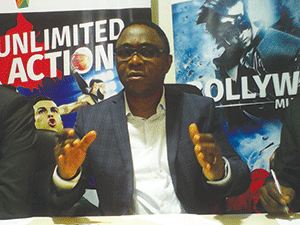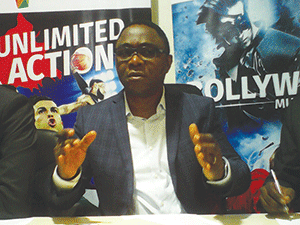Godfrey Orkeh, Chief Executive Officer of new pay TV, African Cable Television, speaks on the intense competition in the market and why it should not be dominated by one brand. Senior Correspondent, GODDIE OFOSE, reports.
Unique selling proposition of new pay TV
Our role is to ensure that we push the limits of what is readily available in the market, to push the boundaries, to make a difference so that whatever we offer in terms of customer service and entertainment packages are available to all our customers across Nigeria at prices that they would really love.
We are already in the market bringing all the innovations that we are talking about, and we are actually having a very good reception. We are in line with our projections in terms of achieving the business target we set this year. So, it’s a good time.
Businesswise we are on target, we are doing much better than expected in terms of where we need to be.
We are bringing innovations to the market and pushing the boundaries, so that traditionally, what was expected to be accessible to only a certain demographic group, we are bringing to the homes of every Nigerian. And we are doing it in a fashion that actually exceeds our market.
Prior to our debut, the general belief was that if you didn’t have 90 to 100 channels in your bouquet you were not enjoying entertainment. Besides, the person at the lowest end of the socio-economic ladder believes that if he was paying N2,000 he should be getting crappy service, poor quality service.
What we’ve done is to see it differently by proving that you can actually have high quality entertainment at an affordable price. That is our objective basically, to push the boundary, put everybody together under one platform of entertainment.
There is no big man, there is no middle man, there is no small man, everybody can afford what we are giving at high quality; and the only way we can do that is to innovate. That is what we’ve done.
Content challenge
There are two types of content we buy in the industry, either raw content or lineal content.
Lineal content is already a channel that has been put together, it’s like somebody who goes to buy food from a restaurant, he buys finished product. But if you don’t want to buy cooked food and you want to do it yourself, you go to the market.
For example, the BBC (British Broadcasting Corporation) is a lineal channel, everything there is controlled by them. They feed it to us, we pick it and we relay it. Everything is controlled by them.
The other aspect is buying content and putting it together, like Ibile. We buy the movies, cut, edit, and put them together with a schedule.
Those are the two types of acquisitions we do as far as content is concerned.
Content affordability
It varies, depending on the category of the content. Some contents are more expensive because they have so much clout, like Discovery Channels, because of the name around them.
There is no fixed price. I can buy content for $1, $100 and up to $1 million. And it is seasonal, it is always for a specific period of time.
But there is no fixed price for content, it depends on how desperate the owner wants to sell, and how desperate the buyer wants to buy.
Survival instinct
There is a monopolistic tendency in the market. Existing legislation in Nigeria allows a dominant player to take advantage of the environment.
Before we came into the market, there was no pay TV for middle income earners; you needed to be ready to pay through your nose to have an Explorer. But now with as little as N15,000 you can have an Explorer.
Beyond that, though it’s true that they enjoy a lot of exclusivities content-wise which will be very difficult to break, because they started many years ago and the idea was that even when competition comes up they may not find anything to buy.
But that has to be addressed by legislation. Our belief is that if you see the trends globally, you will discover that social media is actually creating a lot of awareness where the concept of exclusivities has died.
Even in the movies, all the blockbusters are shown now on the internet. So, in technical terms, there is no exclusivity anymore; it depends on how far the person who wants the content is ready to go.
To address these monopolistic tendencies, we developed a market for ourselves, because right now monopoly is stifling the industry.
Nigeria has a population of over 170 million, with between 26 and 30 million TV households, and we are still struggling with a dominant player saying it has two million subscribers.
It is because of these exclusivities, and it is going to be difficult for one player to handle the market because the market is so huge. People are now seeing the market beyond [English football] premiership and sports.
We did some statistics on what drives people on the TV platform and about 40 to 50 per cent of Nigerians said it’s local content. So, technically there is no monopoly as far as local content is concerned.
We are driving that channel to own local content; even in the foreign axis we have been getting beautiful content to address monopoly.
But Nigerians are the only ones that can take a stand as far as monopoly is concerned, and we have started seeing that in recent social media reactions about what is happening in the industry.
If we don’t have a choice there will always be a monopoly even if it is only a player that is that market. But if you create an avenue for two to three players in the market, there would be options like what we see in the telecom sector where I can port my number, which I believe has taken efficiency to another level.
So, we are getting to a point where, with digitalisation, every Nigerian would be exposed to as many channels as possible. The fact remains that the market is a huge segment. It is too huge to be monopolised.
Crave for foreign content
Currently there are no kiddies programme of Nigerian origin that are very exciting. But we will look at it, because they are not developing it.
Let me give an example of the music industry. At parties that I’ve attended you would have Nigerian music played from the beginning to the end. In the past it was a taboo. What we had then were Michael Jackson and other foreign musicians.
It’s just a time barrier. As more kiddies content is developed by Nigerian producers, we will gradually start shifting. What is needed to change the whole mindset is a Nigerian content with high quality for kids.
But for the adults, we have several.
Elimination of card
We are the first pay TV service provider in Nigeria that is cardless. We eliminated communication between the card and the decoder which hackers work on.
There is nothing that is not hackable, but we have put enough measures in place to make it extremely difficult for hackers.
Second, the software we use is like anti-virus, it’s actively monitored. Our provider is German-based; we have a link from our security to them, so everything that happens they see.
If there is an attempt on decoder, they see.












